Becoming a Responsible Traveller (Bucket) “DO” List
For our sustainable travel tips, we take inspiration from “sustainability is a journey” (Johnathon Day), which for me, begins with a list. What better way to start our journey, of becoming a more responsible traveller, than a sustainable travel tips list to share. I personally like lists for several reasons but one that comes to mind here and is important is, they assist you when changing your mindset…and lets not kid ourselves becoming responsible travellers is just that. So, I have taken note of all the things we have changed and those we wish to change to accomplish this goal.
I feel it relevant to mention here right at the beginning. That whilst I use words throughout such as sustainable travel tips and responsible travelling this is very different to sustainable tourism. Some would even say sustainable travel tips is different to responsible travelling. However, the very first section defines these and how and why they are used the way they are within this article.
As we ourselves have started looking for ways to travel more sustainably and become more responsible travellers, our sustainable travel tips “DO” list is to help us all, on this journey. This list is created from our easy ways for traveling more sustainably, which will give you some insight into why we should all be looking at sustainable travel to become more responsible travellers.
As many of you know I prefer “DO” lists to bucket lists and if you don’t know me, by all means, I love to share why…
These sustainable travel tips are set out in sections (or blocks) for what’s achievable with easy transitioning to traveling sustainably. To begin your own journey to becoming a responsible traveller. For many of us it’s not practical to change everything on the any list straight away, without becoming wasteful. Though if you wish to change everything, right now, we give some practical tips on this also. I personally believe the best and easiest way to start is at the beginning when planning and budgeting for a trip.
In sharing our sustainable travel tips “DO” list with you, I want you to be assured that as we grow on our Sustainable Travel Journey, becoming more responsible travellers so will the list. Additionally, if there are any sustainable travel tips I have missed, or you feel need to be mentioned. I’d love to hear about them in the comments.
*Disclosure: We may have affiliate links with one or more of these companies mentioned & may receive a small commission, at no extra cost to you, if you make a purchase through a link. Please see our full disclosures for further information.
Preview – Sustainable Travel Tips – a Responsible Travellers “DO” List
Our preview, highlights each of the sustainable travel tips and what you will discover at each point of the article…with an internal link that can be used for your benefit…
- Defining Responsible/Sustainable Travelling & Sustainable Tourism – a brief overview of the main differences in responsible or sustainable travelling and sustainable tourism.
- Transport – a list of options that can assist you in contributing to a more positive way of travelling.
- Destinations – consider your destination & how you can reduce impact your presence in the area has.
- When to Go – one of the key sustainable travel tips to becoming a responsible tourist.
- Travel Slower – know your destinations high & low seasons are for the least impact the environment.
- Accommodations – outlines key factors to look for in deciding
- Save on Resources – lists practices that can assist in accomplishing this
- Reduce/Stop – Single Use Items – a list of items that can be simply reduced/stopped
- Support Local Economies – hints on how you can check this off your do list
- Eat Local Produce – outlines some simple ways this can be achieved
- Activities & Tours – consider your “do” list at an destination
- Respect People/Culture – gives an overview of how this can be achieved
- Respect – Destination – lists some examples of how this can be achieved
- Give Back to Communities – overview of step you can take to give back
Our pre-travel checklists, get you started on your independent travel journey. These are completely digital or can be printed if you desire. Keeping things digital is another of our sustainable travel tips. With all you need to get you planning your next adventure without missing a deadline.
Checklists for:
- important to-do lists for “before you travel”
- organising travel essentials
- when to start dreaming and booking
- right up to the day before and walking out the door
Defining Responsible Traveller, Sustainable Travel Tips Travelling & Sustainable Tourism
In some places responsible traveller and sustainable traveller are used in the same context. We have done this also and whilst they both have the same contextual meaning, they are different to sustainable tourism.
In this section we give a brief overview of the main definition differences with responsible traveller or sustainable traveller if you prefer, sustainable travel tips and sustainable tourism.
Responsible Traveller or Traveling
As people become more and more aware of the damage done to our Earth. Including the impact global tourism is having, as outlined by ‘The Sustainable Travel Organistion’. Many people are choosing to make more sustainable and responsible travel choices, thus becoming responsible travellers.
The term “responsible traveller” relates to the personal effort and contribution that can be made, by you as travellers. An effort that can reduce the impact we make upon the Earth, thus lessening the affect traveling can have. It is a personal choice to be a “responsible/sustainable traveller”.
Sustainable Travel Tips
Travelling more sustainably does not always happen overnight. It is often a case of changing certain practices and behaviours whilst travelling, which for one reason or another can be challenging. These are for both before during and sometimes after you travel, our sustainable travel tips gives a list of some of the main things to address either with a change in behaviour or acquiring practices that can benefit you and the area you are visiting. As you get more comfortable with your choices you will go on auto-pilot with your sustainable travel planning.
This term, “sustainable travel tips” relates to a list of actions you can take to become more aware of your choices. A sustainable travel checklist list that we have created that gives you options and suggestions to help you alter your mindset and become a more responsible traveller.
Whilst many are simple to acheive some may require a substantial change in mindset, the way you travel and items you take. All that said, it is a list that you can work on over time, picking one thing and practicing that wholeheartedly and maintaining that action. Is better than choosing several and not being able to maintain it.
Remember it’s the little things that have the great impact…
Sign up for our Newsletter to get our latest tips
Sustainable Tourism
Sad but true, at a personal level there is not a lot that can be done as this is in the hands of the tourism industry. As the Global Sustainable Tourism Council (GSTC) explains that “Sustainable Tourism” refers to sustainable practices in and by the tourism industry. It is an aspiration to acknowledge all impacts of tourism, both positive and negative. It aims to minimize the negative impacts and maximize the positive ones. The biggest thing that can be done on a personal level and one of our sustainable travel tips, is to support accredited sustainable and responsible tourism operators and/or programs.
The GSTC establishes and manages global standards for sustainable travel and tourism, known as the GSTC Criteria. In addition to providing international accreditation for sustainable tourism Certification Bodies. Accreditation can be attained by meeting a set criteria of the GTSC- Recognised Standards for destinations, tour operators and hotels.
The World Tourism Organization defines sustainable tourism as “tourism that takes full account of its current and future economic, social and environmental impacts, addressing the needs of visitors, the industry, the environment and host communities”. For which there is an agenda for 2030, not so many years in the future.
Transport
We have outlined in Traveling more Sustainably that transport accounts for more than 60% of emmissions for the tourist industry. Our sustainable travel tips, will provide some insights and options to help you reduce your own personal contribution to this. All that said, these options and choices also have to fit into your plan and budget, especially if limited by the amount of time you have to see everything.
For us to travel sustainably the first thing we changed, was the transport we used, throught our travels. Where we could, taking direct flights was our choice and the best method. However, this is sometimes not achievable and for us it definitely isn’t living in Tasmania as it an island separated from mainland Australia. Though, two of the sustainable travel tips we do use for flights is airlines that use biofuels and pay carbon offsets.
At our destinations we opt for trains and buses or small group tours for activities. Additionally, if time permits we use trains between towns and countries in Europe, we invariably get a train pass for this. However, I am not suggesting taking a 10hr train trip instead of a 1.5hr flight, especially if you have only a limtied time for your trip.
Within the cities we visit we do an exceptional amount of walking, this keeps us fit as we also like to visit local restaurants and sample the goods. For this we usually download particular maps to the apps we have found to be helpful resources over the years.
These being:
- GPSMYCITY for walking self guided tours
- Voicemap mainly walking and some driving tour maps
- GyPSy Guide for self guided driving tours and day trip maps (mainly USA & Canada)
We are still looking for an app that offers good self “drive” maps of Europe…
Destinations
As travel lovers we all have our list of must do destinations we wish to visit before we kick that old bucket, for us these are on the “MUST DO” List. That said as we regroup and are even more aware of our environment whilst the list hasn’t changed some ways of planning may have and decisions on making our trip to these destinations as sustainably friendly as possible.
Now if you want to go all in, you could choose eco-tourism destinations. To define what eco-tourism is the UNWTO’s, is quite definitive, setting up 5 principle characteristics that must be present in varying forms of tourism to be considered “Eco-Tourism”.
Alternatively, if your DO destination is not match these characteristics, one of our sustainable travel tips involves checking your countries Environmental Performance Index (EPI) results. These are results for 180 countries, which can be accessed to see how well your destination rates. Each country is rated and scored on their environmental performance. You can even select by country and see how it rates for 1 or more of the 18 categories analysed to quantify the score. In addition, to this there is a peer comparison, that allows you to see how well it ranks.
⇑ EPI Peer comparison for selected criteria for Germany
⇐ EPI Ecosystem Vitality Results for Germany
To be perfectly honest we have several destinations on our DO list, which I don’t think we’d alter because it had an extremely low EPI. However, when traveling there I would certainly focus on our other sustainable travel tips, all I could to reduce the impact we have on the area. In addition to considering what sustainable practices are in place and utilising these fully.
When to Go
When you travel to a destination can have a massive effect on the local environment. Whilst tourism can be great for the destination’s economy. Mass tourism with large numbers of people all at once can severely stress on infrastructure and environment. Personally, we love to travel in shoulder or off seasons, less crowds are a big drawcard for us. Additionally, spreading travel out over the seasons also allows for more continuity in staffing, infrastructure and environmental impact. Allowing the area to rejuvenate and flourish. Also consider the hemisphere you are also travelling to, as well as event and weather extremes.

Northern Hemisphere:
- Spring: Mar-May
- Summer: Jun-Aug
- Fall/Autumn: Sept-Nov
- Winter: Dec-Feb
Southern Hemisphere:
- Fall/Autumn: Mar-May
- Winter: Jun-Aug
- Spring: Sept-Nov
- Summer: Dec-Feb

Our biggest sustainable travel tips for when to go is to know your peak & shoulder seasons. Considering these as options to travel to in the place of peak seasons. Checking all you wish to do is still available at these times. I do however also understand that sometimes when we can travel is limited by school breaks, blackout periods at work etc…When this is the case for us and family, we concentrate on our other sustainable travel tips to compensate.
Other options that you can also check are EarthCheck and Green Destinations. The former being a science based benchmarking and certification organisation, whilst the latter is a certification organisation, based on core values.
Travel Slower
When planning your next adventure, seriously consider travelling slower. As we have said mode of transport is the biggest impact on the environment. So, one of our best sustainable travel tips is to stay longer in one destination and use it as your main base. From there you can take day trips out to other places you wish to see.
This works no matter where you are traveling to. Though, on large continents it is sometimes not possible to travel the country from one base and some movement is required. Additionally, there are other benefits to having a main base for 7+ days, you can often get cheaper rates in accommodation for the longer you stay. Other benefits to having a main base is you save on time unpacking, re-packing and travel time between destinations that can be used for day trips in the area.
Whilst I understand his isn’t always possible due to limited leave time if 7+ days isn’t possible consider blocks of 3-4 days in one place. When planning a trip take it from me you only ever scratch the surface and we always have a day where we just wander the city or town we are in.
Accommodation
Many major accommodation chains are re-evaluating their policies to include sustainable tourism practices. You will find many of these chains or individual hotels have participated in EarthCheck Certification. If there are none at your chosen destination, follow the sustainable travel tips, as well as checking when you book your accommodations sustainability practices.
With booking companies such as agoda they have a filter for “travel sustainably property” that you can choose. This also the case with Booking.com, where you can filter for “travel sustainable properties”. These include properties such as the Boutique Hotel Canel, Germany which is a ‘Travel Sustainable level 2’ property based on the criteria set forth by Booking.com.
Another of our sustainable travel tips is to stay in eco-friendly accommodation. Eco-Resorts such as Sarinbuana Eco Lodge, Bali that is a ‘Travel Sustainable level 3’ property, the highest level awarded. This lodge uses natural products throughout as toiletries (locally made), cleaning products, energy saving features and natural pool with no chemicals.
One of our sustainable travel tips includes staying outside of congested areas. This is a particular favourite of ours, when staying 7 days or more. Finding the most sustainable properties we can, which then becomes a base where we can travel between towns via trains or buses. Especially a great option in Europe, where public transport runs so well.
Save on Resources
Whilst your accommodation may have it’s own sustainable travel practices in place, there is no reason whilst you can’t assist further along the way. Which is where this set of sustainable travel tips comes in.
On check-in I always re-check with reception about the hotels policies. At which point, especially if staying more than 2 nights I request our room only be serviced every 3 days.
Where possible to reduce electricity use, keep all non-essential devices and appliances unplugged. With Air Conditioning, we opt to have it off whilst not in the room no matter the temperature outside. We ensure curtains are closed to reduce the direct impact from the outside temperature, whether it’s hot or cold.
I have to say we have stayed in hotels, followed the instructions of hanging towels or left sign on bed to save on resources. In addition to making, it known to housekeeping we are happy not to have towels removed etc and it can still happen. So, we now hang out “Experiencing Privacy” aka “Do Not Disturb” when leaving the room.
As an aside, I love great keys and signs, made from recycled wood at Peppers Silo Hotel.
Reduce/Stop – Single Use Items
Another of the quickest and easiest of our sustainable travel tips is to reduce or stop the use of single use items, switching for sustainable travel essentials. Introducing, actions such as packing your own toiletries. We choose to also use low or no tox, chemical free products not only in our home but when we travel. Solid soaps, shampoos, conditioners and body bars are great options for this. That said we understand this can be expensive to swap straight away, though replacing with eco-friendly products as your toiletries run out can see you having a sustainable travel toiletries in no time.
Another big one for us is having your own reusable water bottle, we use Hydro Flask for it’s Lifetime Warranty. When travelling internationally, ensure your reusable bottle is empty when passing through security. You can find filling water stations once in main departure terminal.
Additionally, taking your own headphones, reduces waste on airlines and other modes of transport. Whilst we travel with our own eating utensils and cutlery, we seldom use these on airlines. Though on recent flights with United Airlines, I noticed that sustainable options were being used for food service.
Whilst we are travelling however, we do take small snack pouches and non-plastic bags to carry snacks and any produce we purchase at local markets during our trips.
Support Local Economies
Supporting local economies is another one of the sustainable travel tips, we believe is extremely important. In particular when purchasing items to take home to loved ones and memorabilia of your travels. We love to collect small items that are significant to our destination and those that are locally made are even better. I personally love support local artists and as much as I love the glass of Murano, only a small piece was selected after a private tour. I do this to limit baggage weight whilst being able to support the artists.
We also always find ourselves on a local walking tour around the historical areas of a destination or taking a small group tour visiting the local producers of food, wine or beverages. I love these tours because:
- They are usually run and operated by locals
- The extra knowledge and hints of other places to go are priceless.
Eat Local Produce
Supporting local community food producers is one of our favourite sustainable travel tips. We especially love trying local cuisines or those of the destination we are visiting. Whether its a food market, a local food store, restaurant or local food tour walking the streets trying local cuisine as we did in Bologna. We try at every destination to immerse ourselves in the local produce. This often includes sampling the local ales, cider, wine or spirits, such a tough job.
Whilst gathering local produce at farmers markets and eating at local eateries is our prefered options. In the case of lunch or dinner, we choose restaurants that support local food producers where possible and hiring local residents. That said breakfast is often included in our hotel rate, though even if it’s not we try to eat at our accommodation some of the time as even in larger hotels, the staff are often local residents. These are also fantastic places to gather some local knowledge of the areas and surrounds.
We do find this to be a balancing act, between local establishments and larger hotels. This is one of the sustainable travel tips that does require some investigation before arriving .
Activities & Tours
One of our basic sustainable travel tips, is to choose ethical and small groups tours. Much of our activities include walking tours, usually involving food, or places of historical or cultural significance. When we do book a small group tour of visit one of the attractions we ensure that they have a third party eco-certification. This can be checked through the GSTC member porthole.
Alternatively, when going through a booking site, such as Viator, Expedia, Trip Advisor or Get Your Guide. Check within the filters for sustainable or eco-certified travel options.
Respect People-Culture
When visiting any destination it is entirely possible many will have local customs or a culture that differs from your homeland. These aren’t just limited to language. We recommend investigating not only the cultural differences of your chosen destination. Especially look for any prominent religious or cultural celebrations that are taking place whilst you are staying. This is one of our sustainable travel tips to help you prepare for differing cultures and religions.
As an example, in Bali, Nyepi Day, New Year’s day in the Balinese Saka Calendar, also known as the day of silence. A Hindu holiday from 06:00 on the day until 06:00 the next day. Where no-one ventures out, no lights, traffic, entertainment, working even the airport is closed. For tourists and non-Hindu residents, whilst not as strict, they still can’t venture out to beaches etc and must remain in their hotels or home…great excuse to lay about the pool and read a book.
Other points that are important to show respect for your chosen destination include:
- Learn Basic Phrases
- Research your chosen destination and respect clothing or behaviour etiquette
- Any photographic etiquette
- Respect Cultural Mannerisms
- Some clothing etiquette includes:
- wearing head dress/scarf (when entering some religious areas)
- removing shoes (common in Asia, Middle East, Eastern Europe, “my place”)
- dress modestly (can be cultural, community or religious)
Respect Destination
Whilst I believe all our sustainable travel tips are important. Respecting the destination you are visiting is always in the forefront of my mind. We always travel with bags to collect rubbish during hikes or tours, even when wandering as often there is a sad lack of garbage bins. We find this at home also, which is a source of endless frustration for me a motto we live by when on local walks, hikes and tours.
“Always take out more than what you take in.”
Another option for respecting the destination you visit is to participate in a local clean-up of the area. These are predominately in or around “Earth Day”, though there are often other times you can help. Check “The great global clean-up” before going.
“Grant me the serenity to accept the things I cannot change,
courage to change the things I can, & wisdom to know the difference.”
“Give Stories, NOT Stuff”
No matter the occasion, giving experiences is one of our top sustainable travel tips and amazing way to build memories.
At Tinggly, they focus on giving back to the planet. Just one example, for every experience purchased Tinggly plants and protects trees.
Give the gift that keeps giving…
Give Back to Communities
For us this is one of our essential sustainable travel tips. I always look for non-profit organisations that align with what we try to do at home. Whether that’s support local projects, conservation efforts, sustainable wildlife endeavours or places that care for those fallen on hard times.
If we are not in a position to volunteer and help directly, we always ensure we make a suitable donation to the organisation/s we have chosen. We do some research on those in the area and give what we can.
Other articles that may help you.
Plan your next adventure – Don’t give up your Daydream
24 Last Minute Gifts for Travellers
9 Creative Ways to Gift Fun Travel Experiences
Our Favourite Travel Planning Resources
From Bucket List to Destination DO List
11 Best benefits of small group tours – and why we love them
11 Easy Ways for Traveling more Sustainably
23 Great Sustainable Travel Essentials – it’s the little things
Travel insurance – Do YOU really need it?
The Points or Pay system when travelling??
6 steps to Create YOUR Perfect itinerary
9 Tips for YOUR Perfect Travel Plan and Budget
7 Essentials to Pack for Cold Climate Destinations
6 Luxury Accommodation Styles Pros and Cons
10 Essential International Travel Checklist Points – All you need to know
I am always happy to reply to any comments, suggestions for next articles or a hello. You can contact me through our Social Media or at jeanine@letsgoawandering.com with any questions or comments.





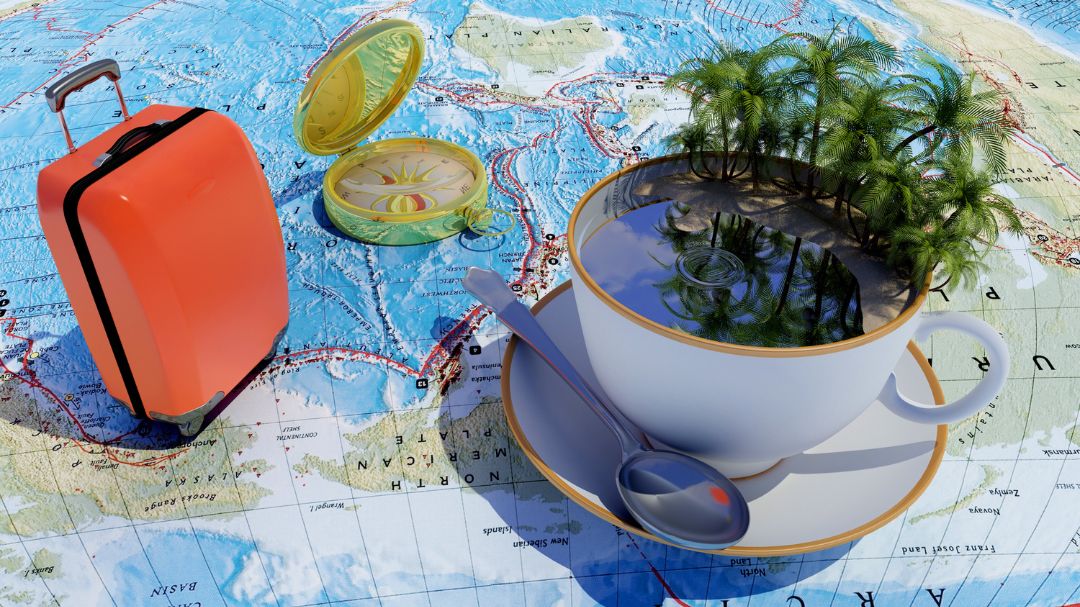
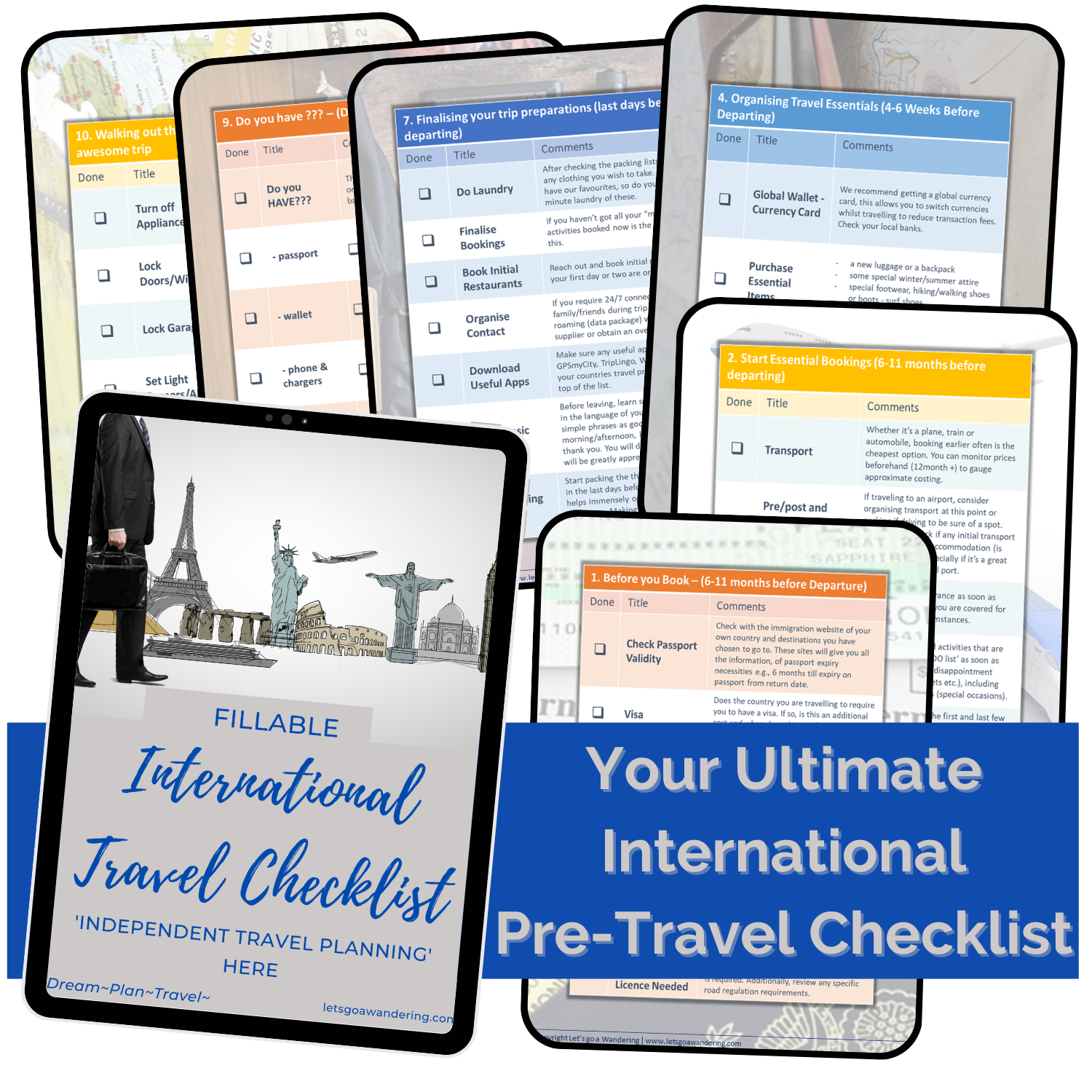
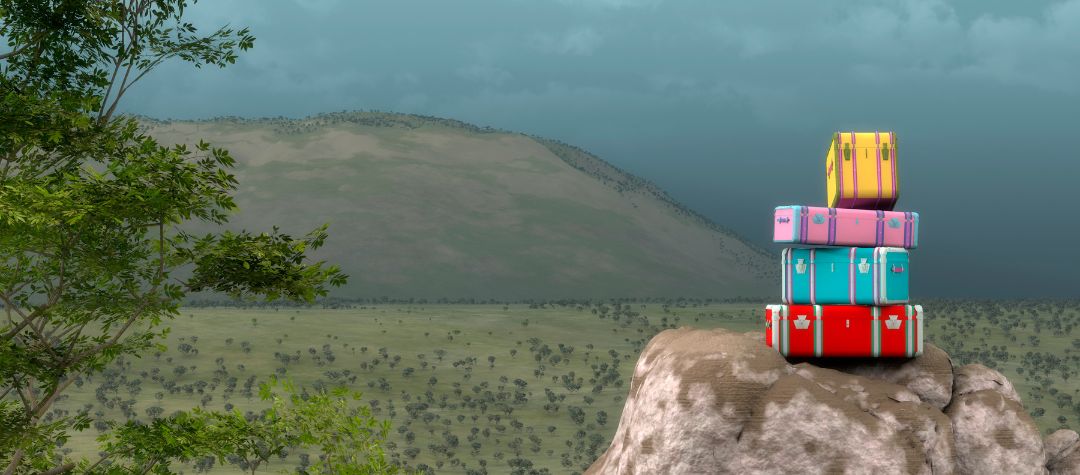
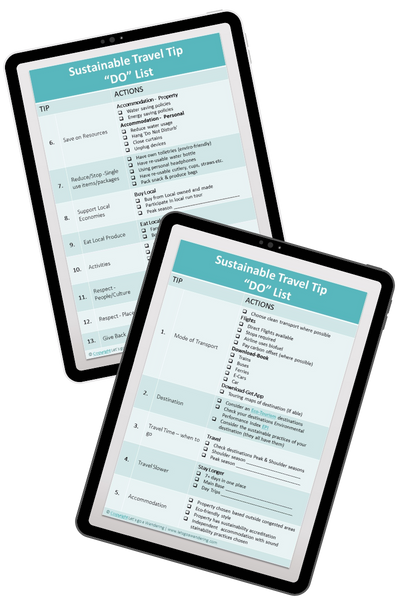
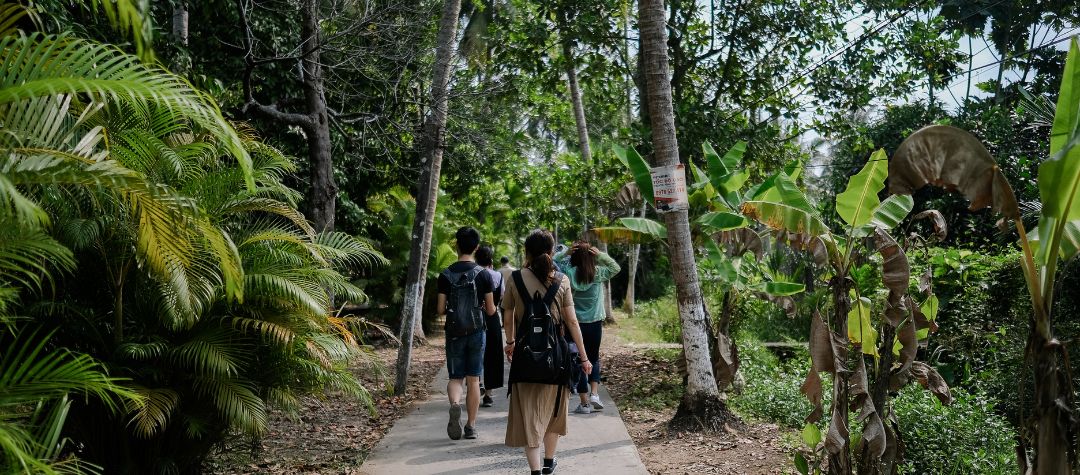
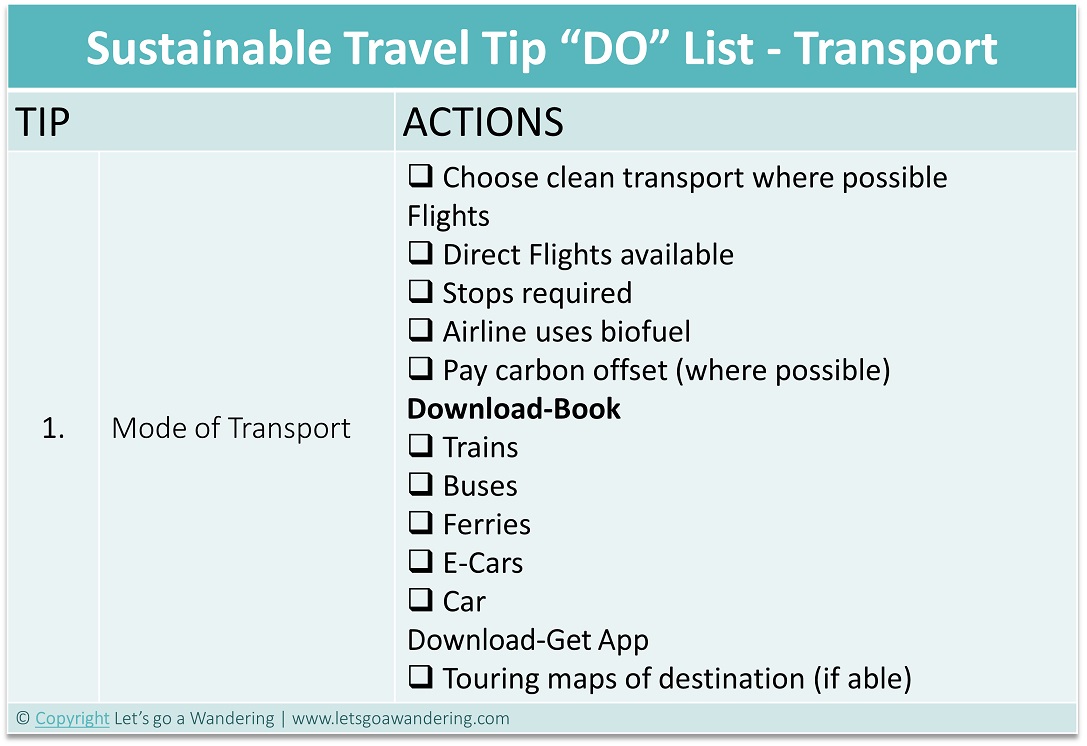
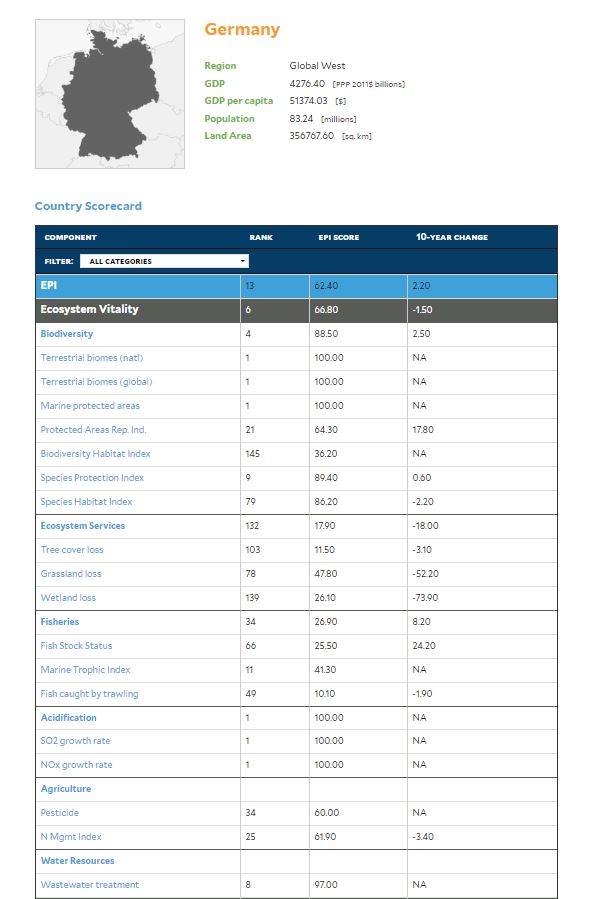
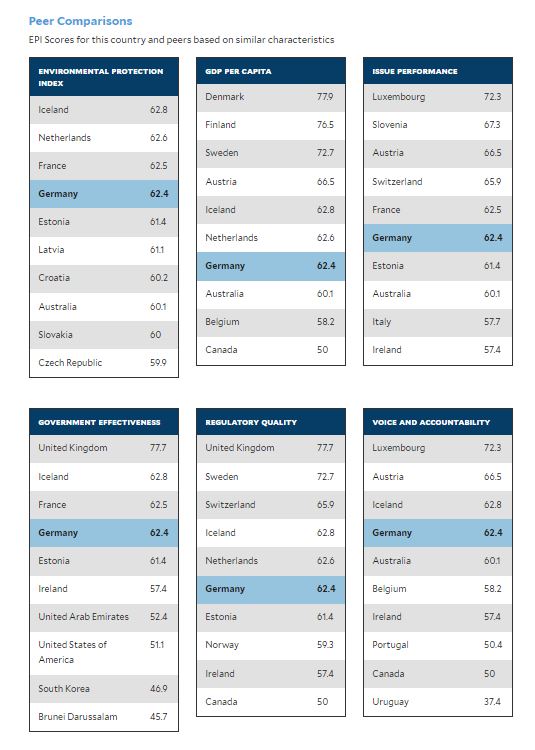
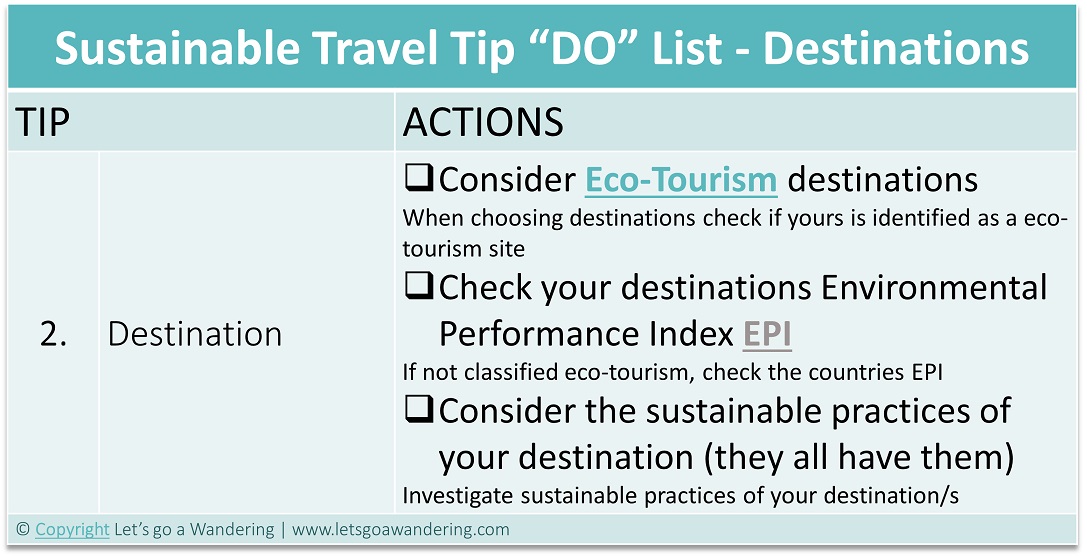
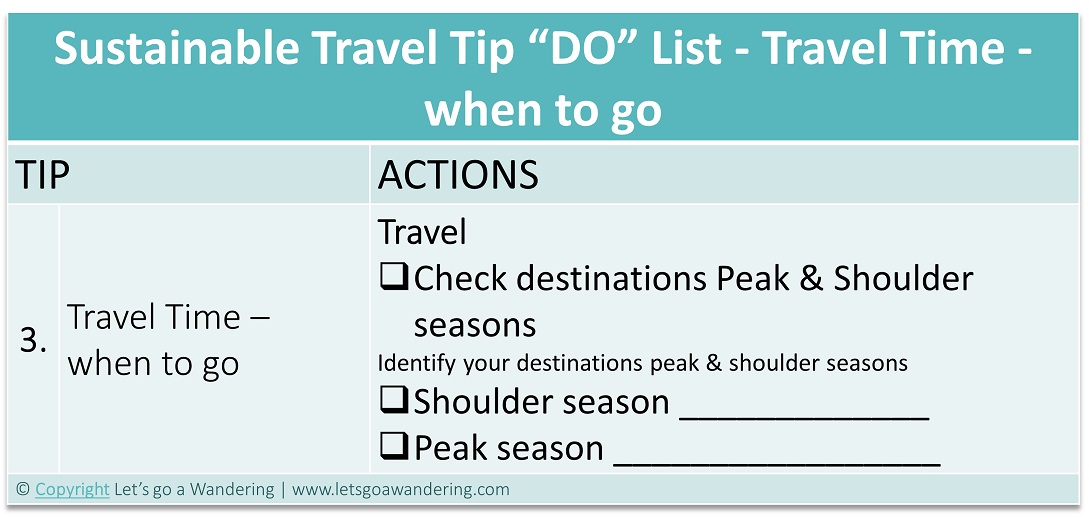
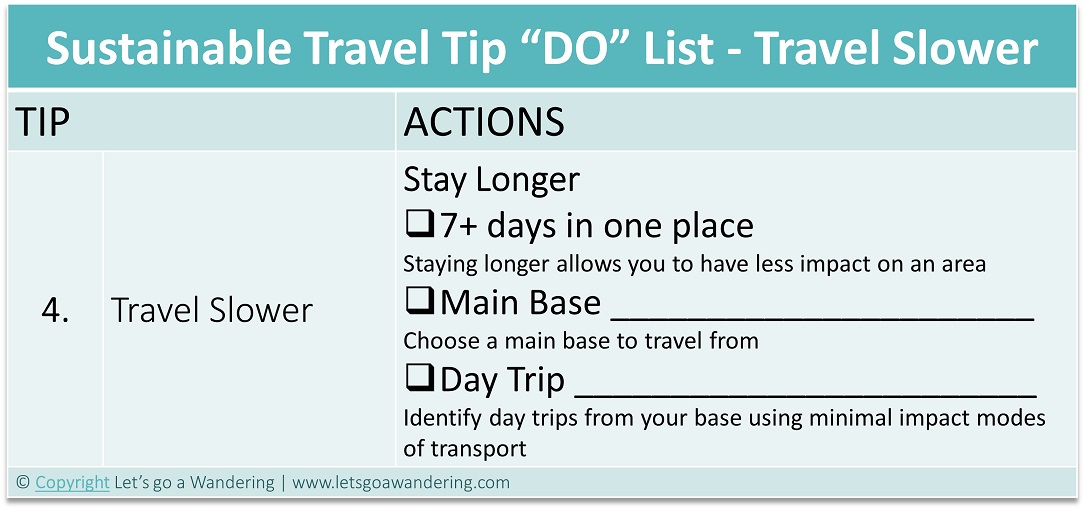
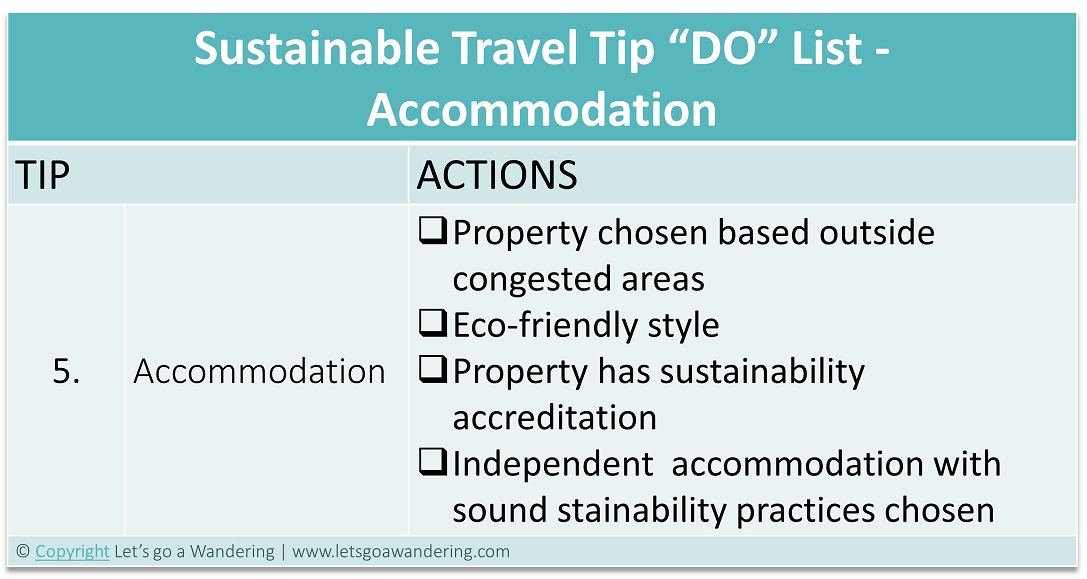

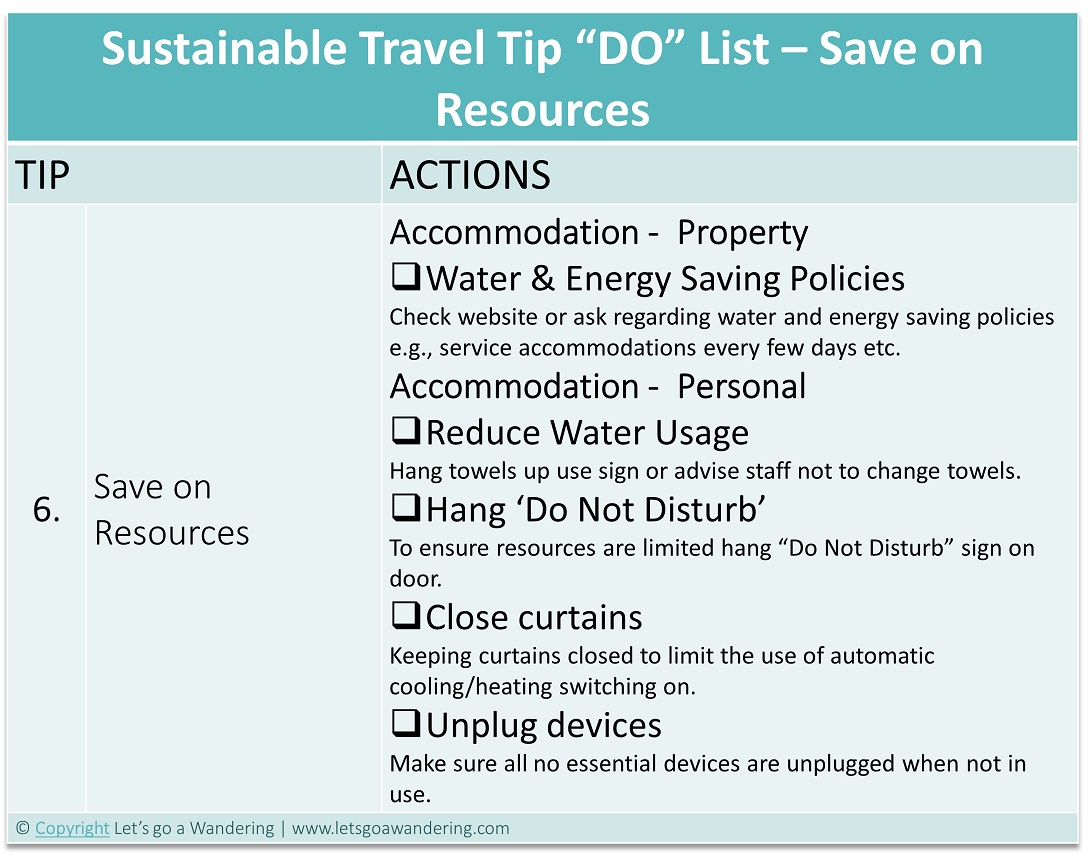
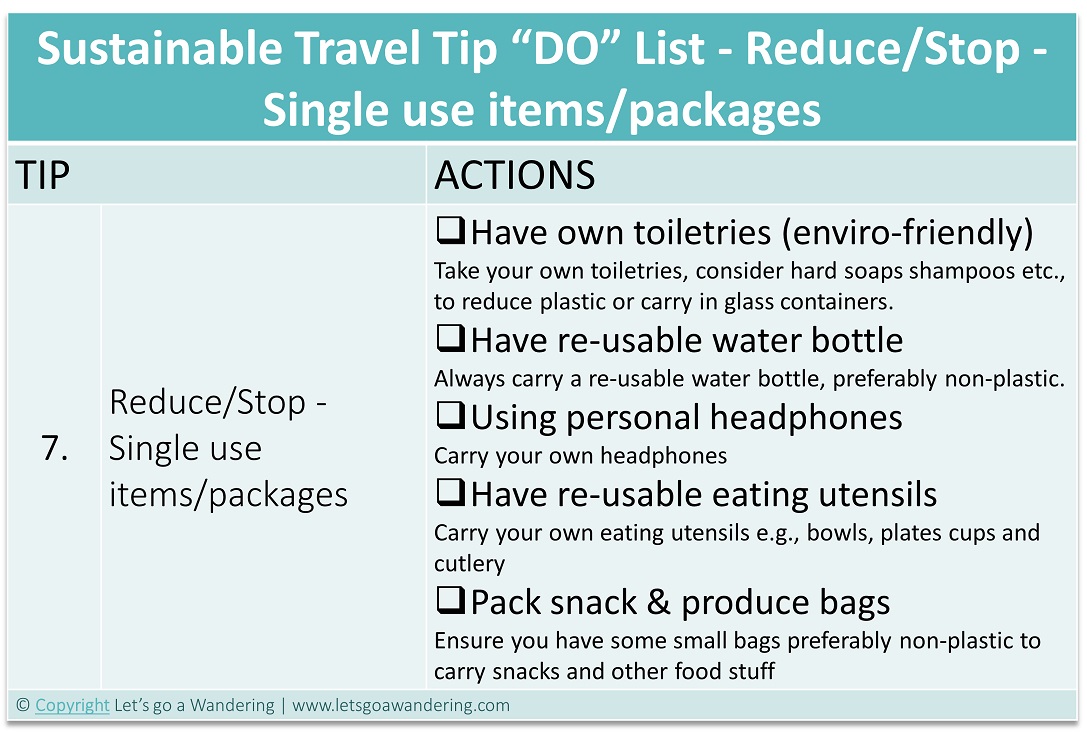
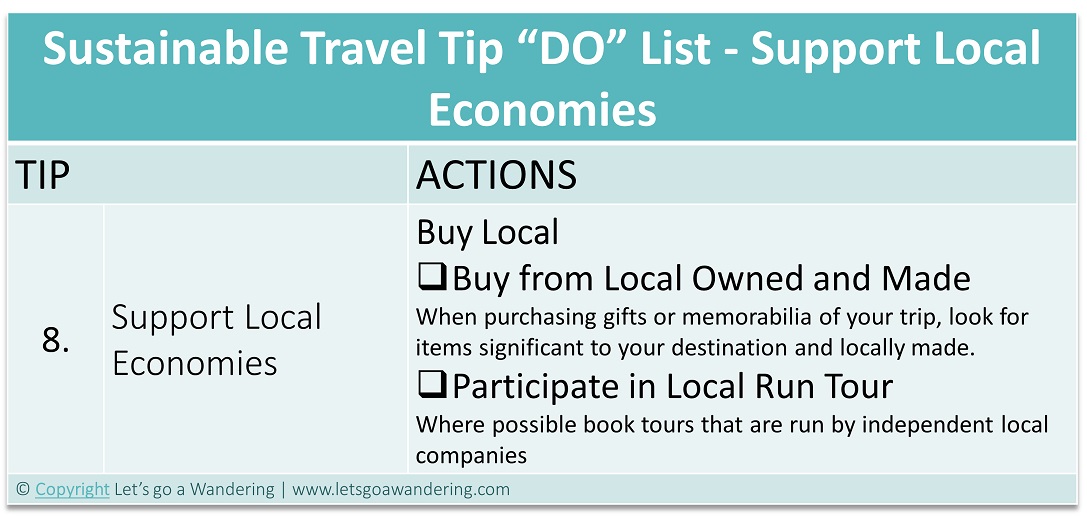
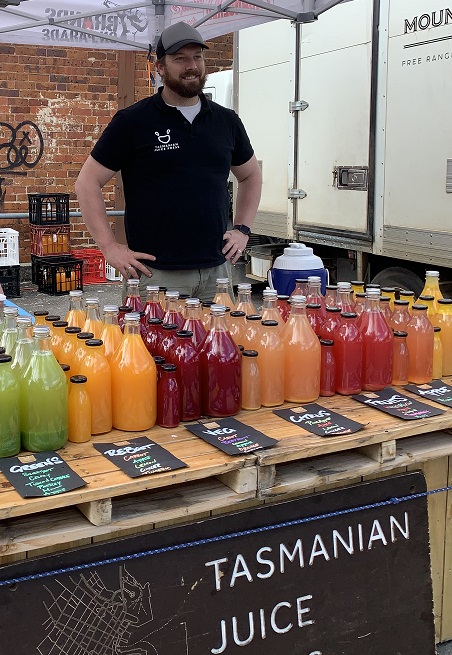

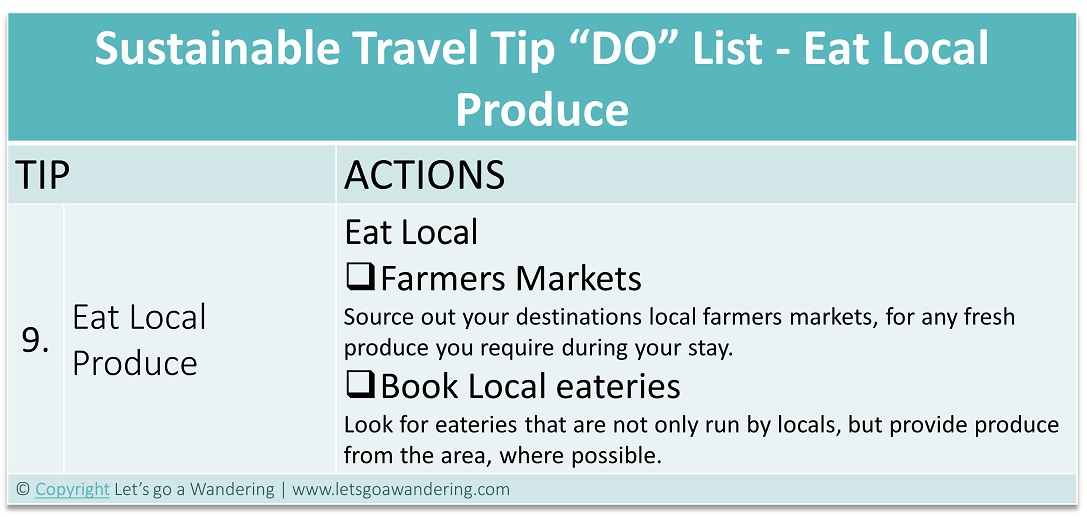
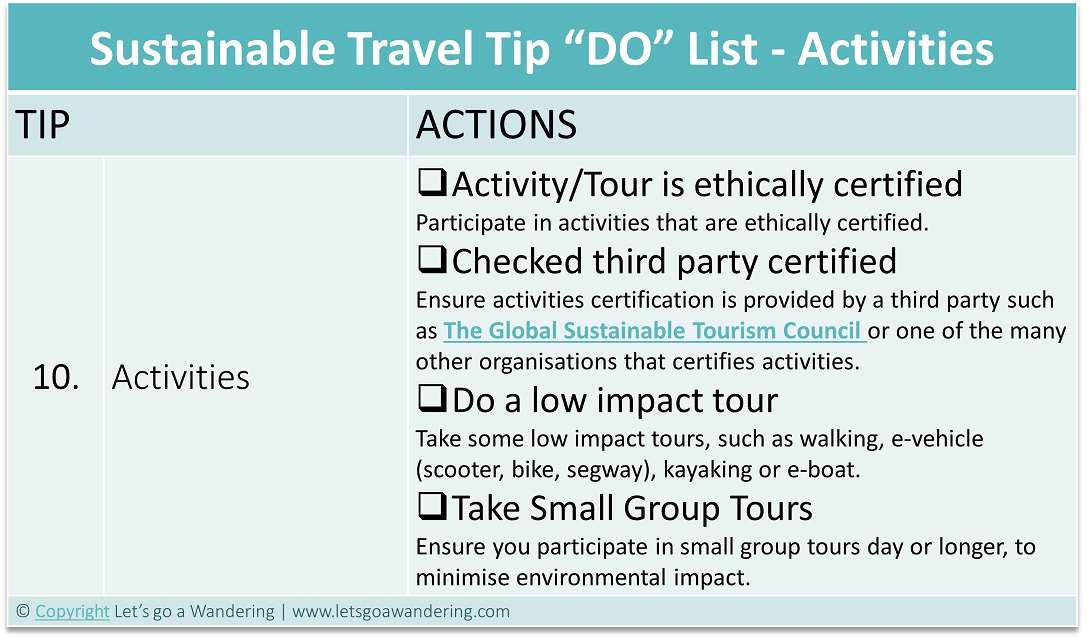
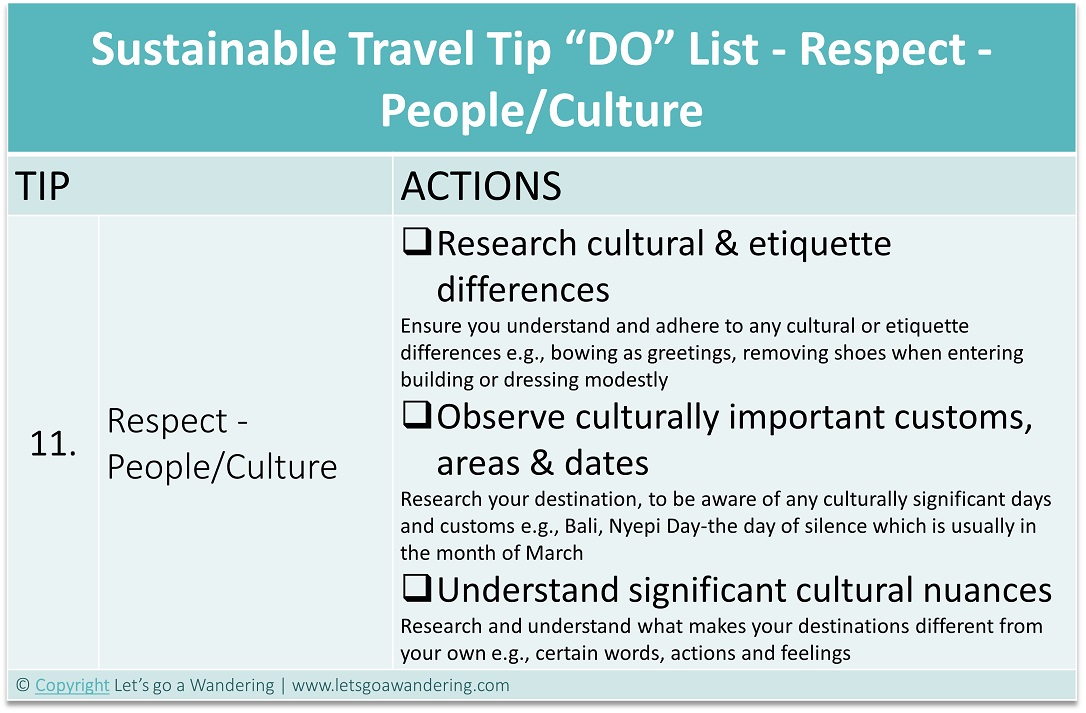
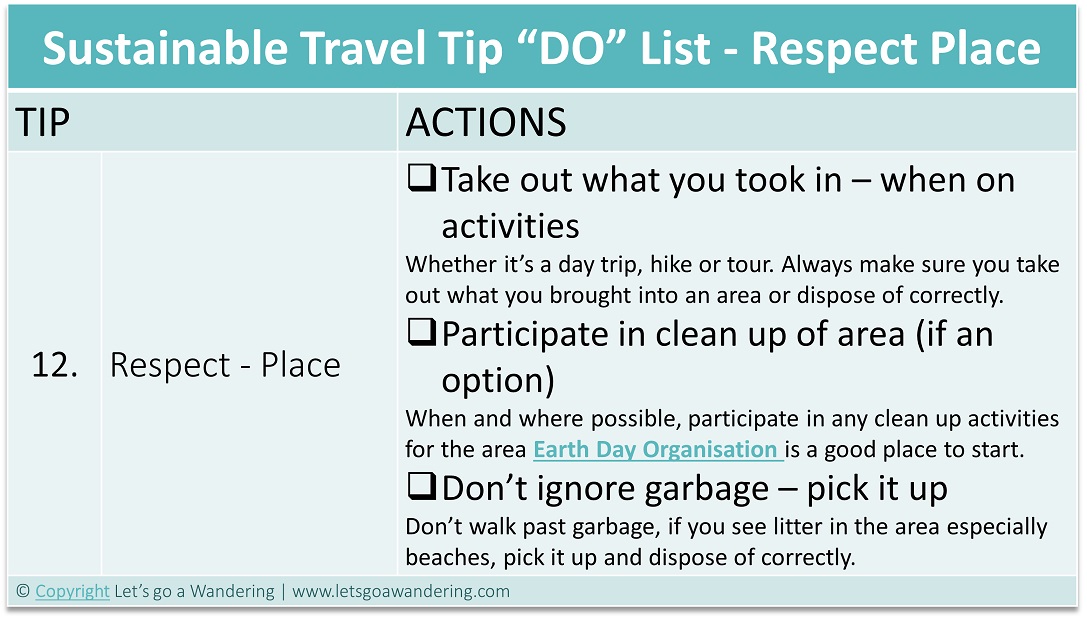

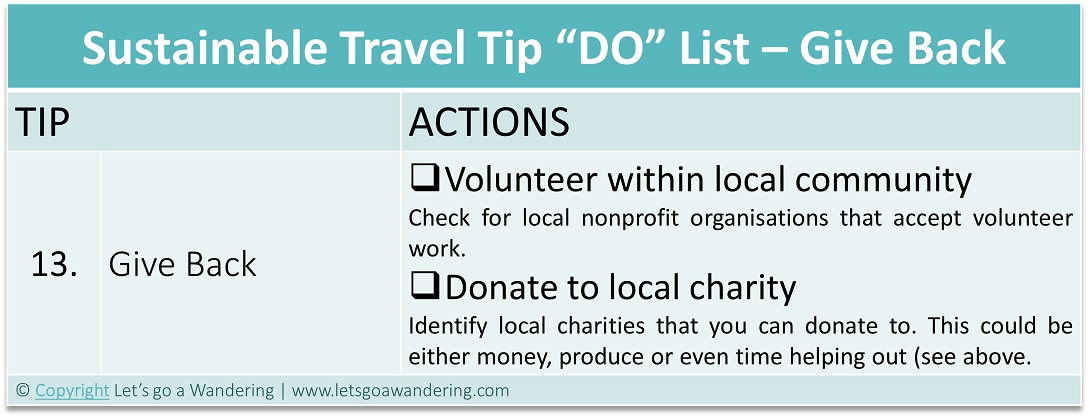
This is really helpful and informative, thank you for sharing. I’ve been travelling a lot slower since the pandemic and massively reduced my flights but this has give me more ideas to implement too!
Thank you..I am so glad it’s of help to you, we have also started travelling slower…reducing flights for us is hard as we live in Tasmania but I do embrace paying the carbon offset and once arrived using trains etc…who doesn’t love a good train trip
I love all these sustainable tips, just the thing we need nowadays.
Thank you, glad you like, we are trying to be more conscious and spread the word also…
Great list of sustainable travel tips, thanks for sharing!
Thank you and glad you liked them
I think of it like a photographer–take nothing but pictures, leave nothing but footprints.
I definitely agree… a picture is worth a thousand words and the memories it invokes are priceless
Great tips to consider when you are planning your next trip. And hopefully able to incorporate them.
Thank you…and any small step can make a big impact…so we do what we can and work towards doing more when we can
This list is wonderful! Sustainable travel is so important to help protect our planet and the beautiful places we visit.
Thank you…I totally agree preserving these wonderful places for future generations to explore is at the top of our list when travelling
Sustainability should be on every travellers mind these days – I love to explore the world, but in a way that does as little harm as possible to the environment .
I totally agree, which is why I put together this DO list…so glad it’s forefront in your thinking also
Such a comprehensive guide. If you are new to traveling, this is perfect.
Thank you and I do love to help people with travel…new starts or some with a bit of travel